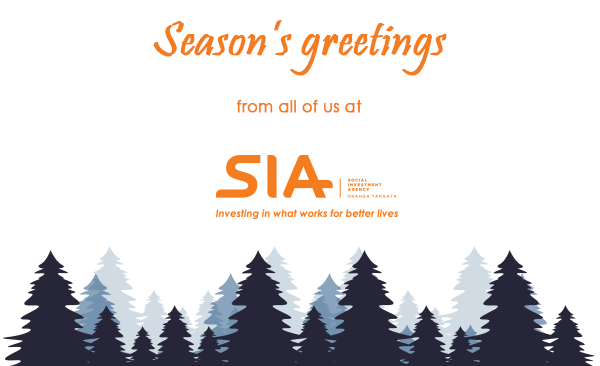I suspect that like most of you at the end of the year, I like to reflect on how the year has gone. And I think 2018 has ‘gone’ just fine. We spent three exceptional months on the road hearing from people across the country about what needs to change if we’re really serious about improving wellbeing (guided by an insightful and supportive working group), SIA has a new leadership team in place, we’ve published what I believe is a ground-breaking and new approach to measuring wellbeing, and just in the last month or so we’ve been out talking to our strategic partners about what 2019 might look like in terms of new ventures.
I want to thank everyone for their generous and on-going support, without which we couldn’t have ended the year in such a positive place. There is a lot to be done in the New Year of course - but that is exciting and we have a solid foundation in place to make it a very successful year.
Have a safe and relaxing break and I look forward to keeping you updated in 2019 on what we’re up to.
Ngā Mihi
Dorothy Adams
We are dedicated to helping social service funders and providers understand whether services are making a difference to people’s lives. We’ve developed a wellbeing measurement approach which outlines how to measure changes in wellbeing at the level of individuals. The approach reflects New Zealand conditions and values, and complements national and global efforts in wellbeing measurement.
Accompanying the wellbeing measurement approach, we’ve developed a new analytical method that measures short term changes in wellbeing associated with certain types of social services. This method combines administrative and survey data to produce a more complete picture of people’s lives. We’ve applied the method to New Zealand’s social housing service to produce preliminary results, and are now re-executing the research with the inclusion of Stats NZ’s latest General Social Survey data.
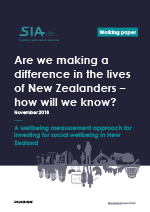 |
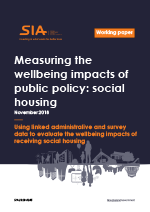 |
The New Zealand Government is focussing on people’s wellbeing and its measurement to complement traditional economic measures of progress. The 2019 budget will be New Zealand’s first Wellbeing Budget and so, for the first time, the budget policy statement(external link) includes a Wellbeing Outlook which describes the current state of wellbeing in New Zealand and what this may mean for future wellbeing.
Meanwhile, the New Zealand Treasury has developed the Living Standards Framework(external link) to enhance the quality of its advice about lifting living standards. Treasury will use the Framework to inform Budget 2019 decisions. The Framework adapts the OECD Well-being Framework(external link) to incorporate what matters most to New Zealanders and our distinct cultural context. A dashboard (external link)presents insight into key aspects of current and future wellbeing.
Simultaneously, Stats NZ is developing Indicators Aotearoa New Zealand(external link) - a collection of indicators to measure New Zealand’s progress in wellbeing and sustainability. The Treasury’s Living Standards Framework will draw on these indicators.
Our wellbeing measurement approach described above aligns with The Treasury’s Living Standards Framework and outlines how to measure changes in wellbeing at the level of individuals.
Metrics matter for policy and policy matters for wellbeing. Stiglitz, Fitoussi and Durand show how over-reliance on GDP as the yardstick of economic performance results in inadequate policy choices with severe and long-lasting consequences for many people. They contrast this with progress made over the past ten years in collecting and using wellbeing data to inform policies, and how to improve measurement.
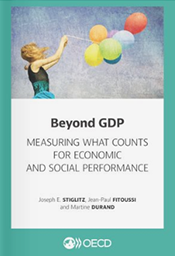 |
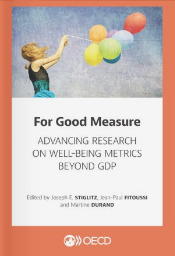 |
| Beyond GDP(external link) argues we need to develop dashboards of what really matters to people’s lives. It looks at progress collecting and using wellbeing data to inform policies, and what still needs to be done. | An accompanying volume, For Good Measure(external link) presents the latest findings from leading economists and statisticians on selected issues within the broader agenda on defining and measuring wellbeing. These contributions look at key issues including how to improve measurement of different types of inequalities, of economic insecurity, of subjective wellbeing and of trust. |
The government wants to develop a new way of working with communities to support New Zealanders to live the lives they aspire to, and build people’s wellbeing. Government also wants to know how to protect and safely use people’s data in the social sector. Earlier this year we met and listened to more than 1000 New Zealanders across the country, to find out what they think about these two topics.
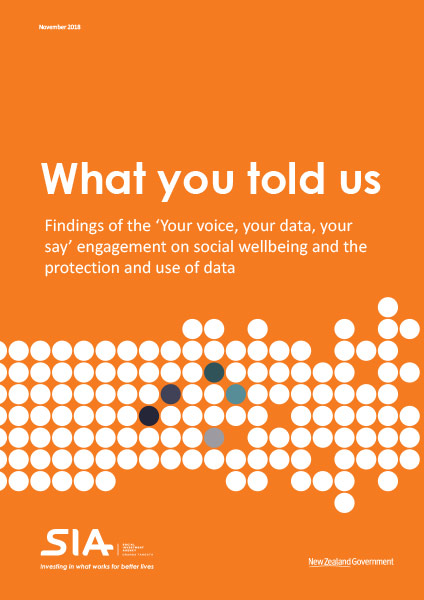 |
Five key themes summarise what we heard:
|
Read the full report and next steps here.
The Hub is a New Zealand government social science research portal that helps policy makers and funders know ‘what works’. We’re working behind the scenes to build advanced search and filtering functionality to get you what you’re looking for faster and more easily. We’ll also be streamlining the publishing process to standardise and simplify research submission and qualification in the future.
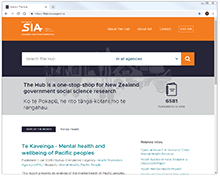 |
Visit the new look SIA Hub(external link) - formerly known as ‘The Hub by Superu’. The Social Policy Research and Evaluation Unit (Superu), established The Hub with a repository of over 6,500 pieces of government social science research. We are indebted to the many people and contributing organisations that made The Hub what it is today. |
Eighteen months into operation, we’re preparing to sharpen and amplify the impact of our work. We’ve established new strategic business groups that reflect the opportunities the social sector has to better understand and champion what works for better lives.
Insights – helps decision makers and advisors by making data, analytics, and research accessible, relevant, and timely.
Data Systems and Analytics – supports data and analytics capability for the social sector by acting as an integrator through the provision of the secure Data Exchange, and by developing analytical methods and products to measure outcomes for social wellbeing.
Partnerships – mobilises partnerships for innovative social sector product and processes. Includes the agency’s communication function which promotes best-practice adoption and builds greater understanding of our work.
Investment and Integration - ensures the agency has an integrated work programme and is focused on the right things to achieve our mission.
Corporate – supports the agency and its people to achieve our mission.
We are supported by our Chief Science Advisor and Chief Māori Advisor.
Meet our newly appointed leadership team.
